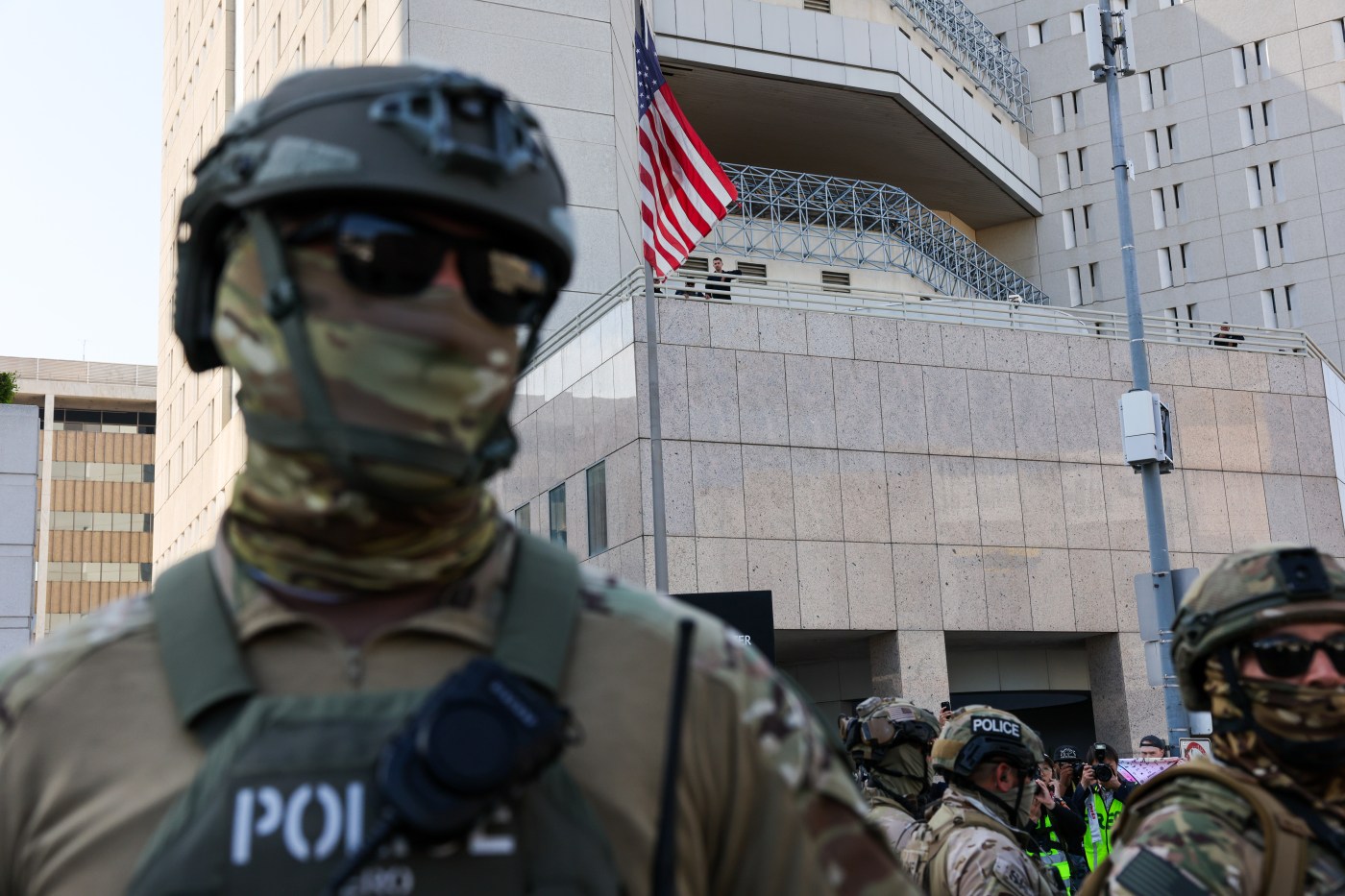
Two Bay Area lawmakers announced legislation Monday that would require all law enforcement officers working with the public in California to be readily identifiable and to restrict where and when they wear masks.
The bill is in response to a surge in federal immigration enforcement operations that have stoked fear and confusion in immigrant communities. Democratic State Sens. Scott Wiener of San Francisco and Jesse Arreguin of Berkeley authored Senate Bill 627, dubbed the No Secret Police Act. It addresses a simmering controversy over whether U.S. Immigration and Customs Enforcement officers and other federal agents should be concealing their faces and identities while carrying out arrests and detentions.
“If we want the public to trust law enforcement, we cannot allow them to behave like secret police in an authoritarian state,” Wiener said Monday. “Law enforcement officers do critically important work to keep our communities safe, and they should be proud to show their faces and provide identifying information when doing so. It boosts trust in law enforcement, which makes it easier for law enforcement to do their jobs and makes California safer for all of us.”
The bill states that local, state and federal law officers and agents would be covered by the law; violations would be punishable as a misdemeanor.
ICE officials have staunchly defended their practices, raising the specter of agents being doxxed — in which personal information is publicly released as an intimidation measure — and having their personal safety compromised. Tennessee Sen. Marsha Blackburn earlier this month introduced federal legislation to outlaw doxxing of federal agents “with the intent to obstruct a criminal investigation or immigration operation,” according to her office.
On June 10 at the Concord immigration court, a woman was accused of assaulting and removing the badge of an FBI agent working at the site, apparently in response to a group of agents disclosing their FBI affiliation but not their names. The agency is offering a $25,000 reward for information leading to her arrest and the recovery of the badge.
An inquiry about the bill to the regional office of U.S. Immigration and Customs Enforcement did not receive a response by Monday afternoon. Visalia Police Chief Jason Salazar, president of the California Police Chiefs Association, said any changes in rules for officers in situations of conflict must find “a balance between public transparency and trust, along with officer safety.”
“We have been in touch with Senator Wiener, who reached out ahead of the introduction of this bill, and we will engage in discussions with him and his office to share our concerns so that we ensure the safety of law enforcement first responders is a top priority,” Salazar said in a statement.
The bill includes exceptions that would allow specialized officers such as SWAT team members to wear protective gear over their faces; transparent face shields would be similarly exempt from the mask prohibition. Officers wearing N95 and medical-grade masks to comply with health policy or to protect themselves from smoke exposure while working at wildfire sites would also be excluded.
Questions would still need to be ironed out about the specifics of the bill, but a key phrase, which references “any mask or personal disguise,” goes to the heart of what Wiener’s office said the bill is trying to root out: Masking with the express intent to obscure one’s identity.
Wiener and Arreguin added that federal agents wearing clothing emblazoned with “POLICE” are sowing confusion by conflating themselves with local police, who are prohibited from conducting immigration enforcement. Furthermore, the senators contend, being unable to clearly identify law enforcement working in their communities prevents residents from holding them accountable for misconduct.
Related Articles
Letters: Valley Water’s plan for Pacheco Dam is out of date
Coming to America? In 2025, the US to some looks less like a dream and more like a place to avoid
California police are illegally sharing license plate data with ICE and Border Patrol
Southern California immigration raids continue, including at weekend swap meet
Coast Guard intercepts suspected smuggling boat 22 miles off California coast
That underpins the second pillar of the proposed bill, which requires officers and agents to be identifiable by their uniform whether it’s through a name, badge number or other marker.
“Our first responders are responsible for vital work in protecting our communities, and trust and accountability are key aspects in keeping our neighborhoods safe,” Arreguin said.
State penal code 830.10 already addresses this, stating: “Any uniformed peace officer shall wear a badge, nameplate, or other device which bears clearly on its face the identification number or name of the officer.” It is not clear whether this code would be affected, though the new bill’s language does offer a more specific definition of the law enforcement officers covered.
Over the past decade, police officers in the Bay Area and California have been criticized for covering their nameplates and badges while working protests, including the series of demonstrations in 2020 over the police killing of George Floyd. In multiple instances, litigation aimed at seeking accountability for protest injuries was stymied by the challenge of identifying the responsible officers.
Rachel Lederman, senior counsel with the Partnership for Civil Justice Fund and the Center for Protest Law & Litigation, said being able to clearly identify law enforcement is crucial in the current climate.
“We’re seeing ICE agents and other federal agents operating not just in plainclothes, but with their faces covered and no indication they are a law enforcement officer. And we have immigrants who are fleeing countries where there are masked agents chasing them and carrying out extrajudicial detentions and abductions,” Lederman said. “I don’t know how much impact this legislation will have on federal agents, but it’s a major issue contributing to panic and terror in the community.”